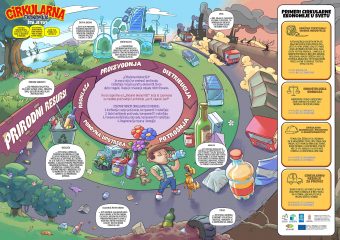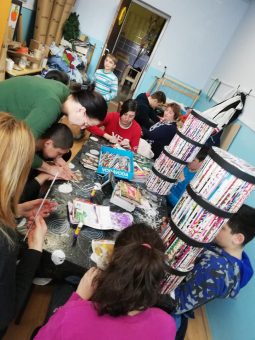
The third cycle of the project “ENV.net factoring the environmental portfolio for the Western Balkans and Turkey in the EU Policy Agenda” (ref. No. 2017 / 394-372) – ENV.net3 was realized in the period from December 2017 to December 2020. Over the three years, well-known partners from the previous two cycles of ENV.net projects, successfully implemented from 2012 to 2016, used resources, knowledge and experience to build a strong network that represents a unique force in advocating and advancing policies through empowerment and opportunities for citizens to have their voices heard.
During the last third ENV.net cycle, the partners worked to strengthen the links made between the various stakeholders in the EU accession countries, to draw the attention of the media and decision-makers to key environmental issues. In the three years, the goal of the ENV.net3 project was fulfilled related to the contribution to the improvement of environmental policies in accordance with EU standards, in terms of strengthening interactions between individual actors in environmental protection, such as civil society organizations, media, local communities and decision-makers and policymakers. The joint actions examined potential opportunities for creating a better technical and financial environment to develop partnerships and joint action of all stakeholders.
The achieved results and the long-term regional partnership have led to the strengthening of the profile of ENV.net as a leading network that connects various participants in environmental protection in the Western Balkans and Turkey in relation to the EU. In addition to the Ambassador for Sustainable Development and Environment, the project partners are six organizations from the Western Balkans and two organizations from the EU: 4X4X4 Balkan Bridges, Advocacy Training and Resource Center, Green Home, Lir Evolution, TEMA – the Turkish Foundation for Combating Soil Erosion, for Reforestation and Protection of Natural Habitats, European Environmental Bureau (EEB) and Foundation Punto Sud.
The Circular economy encompasses but also goes beyond waste management Perhaps the project’s biggest success is the launch of a discussion related to the circular economy in the region, as well as the intensification of activities related to climate change. Activities related to the exchange of experiences with partners from EU countries were adapted to the situation caused by the Covid-19 pandemic. Thus, the virtual tour planned for Italy’s experience in the circular economy was organized by Punto Sud partners from Italy, and a special productive way of a consultative virtual meeting with EU representatives, organized by EEB, a partner from Belgium, was used in a very productive way. Also, the participation of the representatives of the ENV.net project in the conference of the signatories of the UN Convention on Climate Change was realized.
In focus:
Besides, the ambassadors of sustainable development and the environment participated in scientific and professional conferences, presenting the results of the ENV.net project (such as the Fifth Eurasian Symposium on Waste Management), where Prof. Andjelka Mihajlov PhD., a thematic expert on the ENV.net project in Serbia, presented the paper “Circular economy surpasses waste management.” A new paper was accepted, which will be presented in 2021 at an international conference in Athens (“Communication and Management”). It is based on research conducted by the Ambassadors of Sustainable Development, in cooperation with the Ebart Media Archive, during the ENV.net3 project cycle for the nexus of environmental issues. Also, at the Universities of Belgrade and Novi Sad, as well as at meetings of eco-school coordinators, representatives of various educational institutions involved in the Eco-school program, lectures were held to students and teachers on the basics of circular economy and climate change to stimulate their reactions and readiness to act. The circular economy is one of the main topics of this cycle of the ENV.net project. Introducing the circular economy in different segments and towards different interested parties has contributed to a better understanding of the concept and concept and further promotion of the transition from linear to so-called “circular economy” in different local communities. Eco-schools and civil society organizations in Serbia have played a special role in this through the sub-grant scheme within the ENV.net project.

Four organizations: Zlatibor Circle from Čajetina, Planet from Sombor, Eco-Musketeers from Belgrade and the Center of Expertise for Natural and Economic Resources from Belgrade, in cooperation with Eco-schools in their local communities, developed relations with decision-makers and presented the results of work so far in promoting the concept of a circular economy and their efforts to combat climate change. The sub grants were awarded to civil society organizations that had joint activities with Eco-schools from their communities. They chose the topics of circular economy, climate change or monitoring progress in the development of environmental policies. Also, within the subgrants, together with the Ambassadors of Sustainable Development, an analysis of policies/regulations related to the environment and climate change in Serbia was made and presented in the form of a monitoring matrix, which can serve in further work on establishing sustainable and integrated environmental protection system, including all actors and stakeholders.
Longer used resources reduce the amount of waste
The analysis “Circular Economy in Serbia – The Process Started” was created to develop a methodology for assessing the state of the circular economy in the Western Balkans and Turkey through the project ENV.net3. Authors Prof. Andjelka Mihajlov, PhD, Aleksandra Mladenović and Filip Jovanović, within this analysis (which was done as a compilation of a limited amount of available information), understand the term circular economy as follows: Circular economy is an economy in which the value of products, materials and resources is maintained in the economy as long as possible, and waste generation is minimized. This is in contrast to the “linear economy”, which is based on the model of production and consumption “take, consume and discard”.
That is how the first report on the circular economy was created, presented at the first regional conference on the circular economy held in November 2018 in Belgrade, where all previous participants in the process of introducing the circular economy in Serbia were presented international organizations, national and local decision-makers, civil society organizations and, of course, economic entities that have based part or all of their production on the principles of the circular economy.
The following progress reports on the further development of the circular economy in the Western Balkans and Turkey were presented at two more regional conferences held in Tirana and the last virtual conference hosted by Turkish partners. The partners of the Ambassador for Sustainable Development and Environment in the advocacy campaign during the ENV.net 3 project on the topics of circular economy and climate change were the French Institute in Serbia, local communities, the EU Convention in Serbia and of course, Eco-schools. ENV.net 3 project and project “Caravan for Climate – All active in the fight against climate change!” crossed paths and together tried to point out the problems of climate change, raise awareness of the existence of this global problem and mobilize citizens, the economy, public institutions and decision-makers. “Green growth” was presented as a new opportunity for development through the promotion of simple and operational solutions that every citizen or business entity, decision-maker or civil society organization can apply and fight against climate change in their own way.
Eco-schools from a dozen cities in Serbia had the opportunity to host the exhibitions “Life of Garbage” and “Conquering Renewable Energy Sources” and encourage local decision-makers to take actions that will lead to environmental improvement and climate change mitigation. Together with the National Convention in Serbia, the need to support all initiatives that bring Serbia closer to the realization of the concept of circular economy was emphasized. It was proposed to the competent Ministry of Environmental Protection to adopt an innovative National Strategy for Sustainable Use of Natural Resources and Goods which would strategically complete all areas of importance for the circular economy along with the National Waste Management Strategy.
Read the story in the new issue of the Energy portal Magazine CIRCULAR ECONOMY march 2021.-may 2021.



